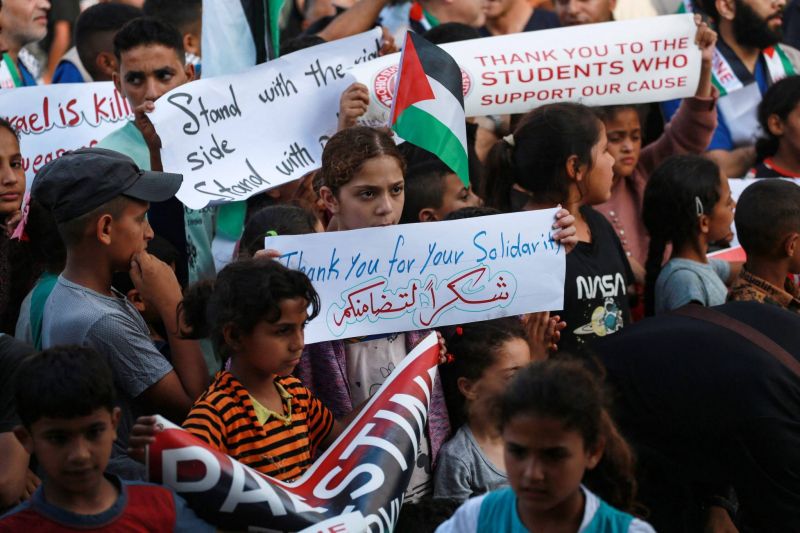
Palestinian children hold signs thanking pro-Palestinian student solidarity initiatives at American and Canadian universities on their campuses, during a rally in Deir al-Balah in the central Gaza Strip, May 1, 2024. (Credit: AFP)
Mahmoud Mohamad Mustafa al-Khattar was living in Hay al-Toffah, a neighborhood in Gaza-City, when Israel began its attack against the enclave on Oct. 7. Displaced to Rafah, in southern Gaza, as Israel pushes its assault southwards, he now, more than seven months later, finds himself at an impasse. The Israeli army is poised to begin a ground invasion in Rafah, but he and his family are not about to move northward, fearing overcrowding and disease. He tells L'Orient Today his story.
Khattar lives in a small tent with his wife, daughter, mother, sister and his sister’s children. "The tent is not suitable for anyone to live in, but the circumstances made it this way," he said. "We don’t know where we are going to go now after the Israeli threats against Rafah, because Khan Younis and Deir al-Balah are full and there is nowhere to put our tent," he explained, adding, "We don’t know what we’re going to do."
The father also described the emotional rollercoaster this past week alone has been. "The day before yesterday, we thought that there was a truce, and we got happy. Then the Israelis said they did not agree, so we got sad, and now we don’t know what to do or where to go. Life is hard," he said.
He lamented the circumstances facing Gaza's children, saying, "The children are deprived of life; they’re supposed to be playing, but this is God’s will."
"We in Rafah have been here for four or five months after being displaced several times, and then they sent us to Rafah. Now they are telling us to evacuate, but Khan Younis and Deir al-Balah are full and [they are also] full of diseases," he explained. It is very hard, and we hope that there will be a cease-fire, the war to stop, and things to be resolved because our lives are dead human beings' lives."
Khattar also pointed our that "there is no transportation to even relocate."
On Monday evening, Hamas declared its acceptance of a cease-fire proposal. Ismail Haniyeh, the leader of Hamas, conveyed to mediators, Qatar and Egypt, that his group had agreed to their cease-fire suggestion for Gaza, aimed at ending seven months of violence in Gaza. Hamas' acceptance of the cease-fire proposal came after more than seven months of Israeli airstrikes that claimed the lives of around 35,000 individuals in Gaza, with half of them women and children, in response to Hamas' October assault, which resulted in the deaths of 1,200 people according to Israel and the abduction of 252 others. Israel however has not agreed to the terms of the cease-fire agreement Hamas has accepted.
The prospect of an imminent cease-fire prompted jubilant scenes in Gaza's streets upon Hamas' announcement of its acceptance on Monday, but three days later no deal has been finalized and Israel appears to be proceeding with its Rafah operation plans.